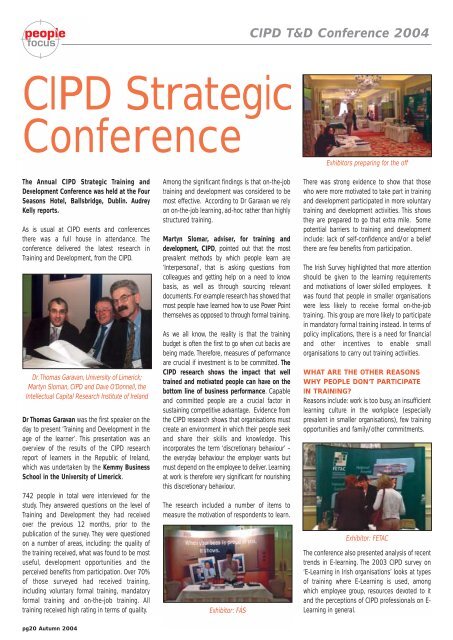People Focus Spring 04 NA - CIPD
People Focus Spring 04 NA - CIPD
People Focus Spring 04 NA - CIPD
- No tags were found...
You also want an ePaper? Increase the reach of your titles
YUMPU automatically turns print PDFs into web optimized ePapers that Google loves.
<strong>CIPD</strong> T&D Conference 20<strong>04</strong><strong>CIPD</strong> StrategicConferenceExhibitors preparing for the offThe Annual <strong>CIPD</strong> Strategic Training andDevelopment Conference was held at the FourSeasons Hotel, Ballsbridge, Dublin. AudreyKelly reports.As is usual at <strong>CIPD</strong> events and conferencesthere was a full house in attendance. Theconference delivered the latest research inTraining and Development, from the <strong>CIPD</strong>.Dr. Thomas Garavan, University of Limerick;Martyn Sloman, <strong>CIPD</strong> and Dave O’Donnell, theIntellectual Capital Research Institute of IrelandDr Thomas Garavan was the first speaker on theday to present ‘Training and Development in theage of the learner’. This presentation was anoverview of the results of the <strong>CIPD</strong> researchreport of learners in the Republic of Ireland,which was undertaken by the Kemmy BusinessSchool in the University of Limerick.742 people in total were interviewed for thestudy. They answered questions on the level ofTraining and Development they had receivedover the previous 12 months, prior to thepublication of the survey. They were questionedon a number of areas, including: the quality ofthe training received, what was found to be mostuseful, development opportunities and theperceived benefits from participation. Over 70%of those surveyed had received training,including voluntary formal training, mandatoryformal training and on-the-job training. Alltraining received high rating in terms of quality.Among the significant findings is that on-the-jobtraining and development was considered to bemost effective. According to Dr Garavan we relyon on-the-job learning, ad-hoc rather than highlystructured training.Martyn Slomar, adviser, for training anddevelopment, <strong>CIPD</strong>, pointed out that the mostprevalent methods by which people learn are‘Interpersonal’, that is asking questions fromcolleagues and getting help on a need to knowbasis, as well as through sourcing relevantdocuments. For example research has showed thatmost people have learned how to use Power Pointthemselves as opposed to through formal training.As we all know, the reality is that the trainingbudget is often the first to go when cut backs arebeing made. Therefore, measures of performanceare crucial if investment is to be committed. The<strong>CIPD</strong> research shows the impact that welltrained and motivated people can have on thebottom line of business performance. Capableand committed people are a crucial factor insustaining competitive advantage. Evidence fromthe <strong>CIPD</strong> research shows that organisations mustcreate an environment in which their people seekand share their skills and knowledge. Thisincorporates the term ‘discretionary behaviour’ –the everyday behaviour the employer wants butmust depend on the employee to deliver. Learningat work is therefore very significant for nourishingthis discretionary behaviour.The research included a number of items tomeasure the motivation of respondents to learn.Exhibitor: FÁSThere was strong evidence to show that thosewho were more motivated to take part in trainingand development participated in more voluntarytraining and development activities. This showsthey are prepared to go that extra mile. Somepotential barriers to training and developmentinclude: lack of self-confidence and/or a beliefthere are few benefits from participation.The Irish Survey highlighted that more attentionshould be given to the learning requirementsand motivations of lower skilled employees. Itwas found that people in smaller organisationswere less likely to receive formal on-the-jobtraining. This group are more likely to participatein mandatory formal training instead. In terms ofpolicy implications, there is a need for financialand other incentives to enable smallorganisations to carry out training activities.WHAT ARE THE OTHER REASONSWHY PEOPLE DON’T PARTICIPATEIN TRAINING?Reasons include: work is too busy, an insufficientlearning culture in the workplace (especiallyprevalent in smaller organisations), few trainingopportunities and family/other commitments.Exhibitor: FETACThe conference also presented analysis of recenttrends in E-learning. The 2003 <strong>CIPD</strong> survey on‘E-Learning in Irish organisations’ looks at typesof training where E-Learning is used, amongwhich employee group, resources devoted to itand the perceptions of <strong>CIPD</strong> professionals on E-Learning in general.pg20 Autumn 20<strong>04</strong>
















